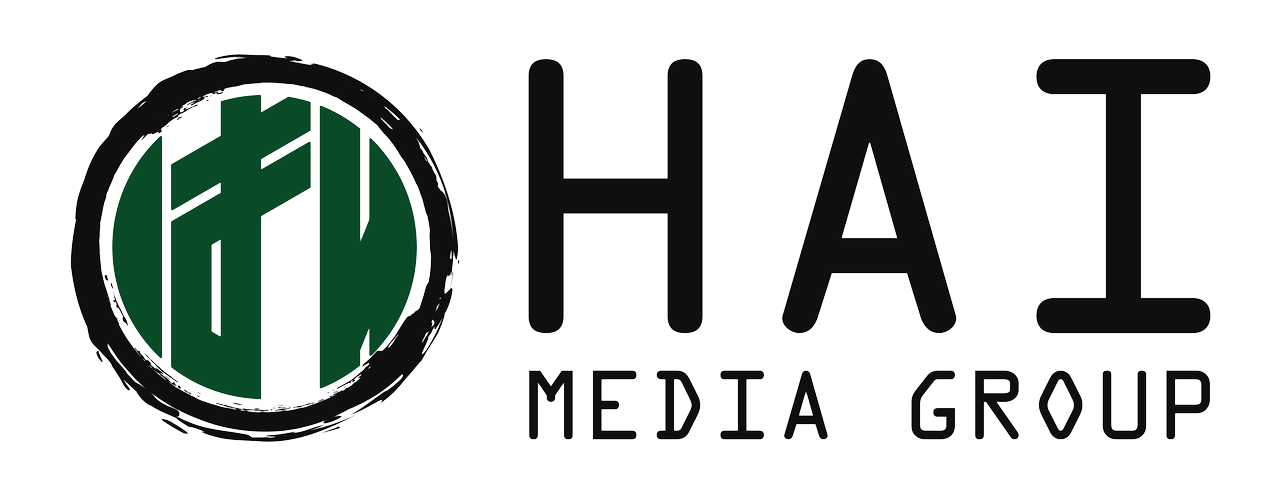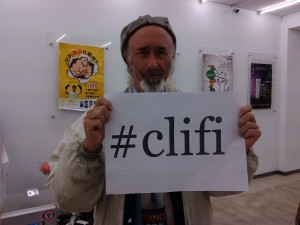
by Lisa Devaney | 30 Jul, 2014 | News
As fans of all things DIY PR, when we came we came across an amazing DIY PR story from Taiwan, we decided to share it with you here.
We’ve gotten to know Dan Bloom who is an American climate activist and journalist living in Taiwan. He’s best known as being the inventor of a new literary genre called cli-fi, a kind of sub-genre of sci-fi that defines literature and film that includes climate change in the storyline.

Dan Bloom
The self-confessed “envisionary futurist” graduated from Tufts University in 1971, where he went on to serve as the acting editor of the non-profit Polar Cities Research Institute. He has no formal training in PR, nor does he claim to be any kind of PR genius, but somehow he is making the world pay attention to cli-fi.
Even though Dan has no computer in his home, he has managed to win headline’s in the world’s leading media outlets about cli-fi. A guest article he did was recently featured in the Washington Post. Cli-fi has also been featured in US Wired, NPR, The Guardian, The Huffington Post and many more outlets since Dan first coined the phrase cli-fi back in 2007. Just this week he was included in a story about cli-fi in The New York Times.
So how does he do it? Well, we caught up with Dan by email, where he was writing to us from a smoke-filled café in Taiwan. Here’s our conversation with him:
–
Firstly, for those who don’t know, what is cli-fi, and how did it come about?
DB: Cli-fi is a new literary genre term first of all, and secondly a new literary genre, too. So it is both a term and a genre. It came about after I spent many months trying to find a way to get past the daily political debates about climate change and global warming, all statistics and scientists and leftwing rightwing people screaming at each other. I thought that maybe a better way to convey the dangers future generations will face in terms of the coming Climapocalyopse — not now but in 500 years or so — would be to create a platform for writers and screenwriters to use for novels and movies. So I set it up.
You were featured in an article published in Washington Post, that’s a pretty big deal! How did that happen?
DB: I read that the Post had a new section online called PostEverything where writers could submit commentaries on just about anything, so I queried the editors there and they said I could send my piece in on spec. And they used it.
You’ve also secured coverage for cli-fi in Wired US, NPR, The Huffington Post and many other outlets. These are amazing wins for any PR professional, what are tips you can share with those doing their own PR?
DB: Just as in retail the key to success lies in three words “location, location, location” so too does PR have an important rule which is this: “never give up, never give up, never give up.” And don’t take no for an answer.
Every genius has a strategy, what’s yours?
DB: I am not a genius. I am not even a professional PR person. I practice what I call guerrilla PR, street PR, sidewalk PR, never give up PR. I also had Lady Luck in my corner. Without Lady Luck egging me on, we wouldn’t be talking here. I owe everything to three things on this cli-fi PR campaign: Lady Luck, friends in the right places and an Internet that connects us all. In the old world pre-internet, I would still be at the starting line. The Internet made this possible.
Can you tell us more about your DIY PR tactics and strategy and how you are making this all happen with no computer, and just working out of a smoke filled café in Taiwan?
DB: I don’t really have an office or a game plan. I just wake up every morning and start emailing anyone I think might be able to help cli-fi find the right media placement. And I get up the next day and repeat the process. Because this work is important to me and for future generations, I have been doing this PR work daily Monday to Sunday, without one day off in 8 years. No vacations or anything. I just feel strongly about the emergence of the cli-fi genre, and this is not “work“ for me. This daily crusade is my vacation. It is relaxing and rewarding beyond words or payment. I don’t get paid for this. That is another reason I have been successful. This has never been about me or fame or money. This is about the most crucial existential time period we humans have ever faced. I am just a foot soldier in a large army of climate fighters. I feel honored to be part of something much larger than myself, and much bigger than a mere brand or product placement campaign. This is the fight of our lives now, and for our descendants in the future, if there are to be any.
Aside from creating literary genres, what other jobs do you do?
DB: This is all I do now, 24/7/365. I wake up every morning energized and ready to go. I am never tired. I have not taken one day off in 8 years. There is nothing else I want to do.
Is there anything more you’d like to share with us about cli-fi, DIY PR, life in Taiwan, the future of our planet Earth, or anything else that readers of this piece might find of interest?
DB: Fighting climate change problems and global warming impact events is now the job of every human being on Earth. But I am not a preacher, and everyone has to find his or her own way to joining the fight, either in small ways or large ways. And the last thing I’d like to add is this: the word Earth should have a capital E every tine it appears in a British or American newspaper or website. Many news outlets still write it in lowercase as “earth” but it is our Earth and it is home planet and deserves a capital E, even in The Guardian and New York Times. I recently asked Diane Ackerman the nature writer in New York about this and she emailed me in reply: Yes, we should always capitalize Earth in our newspapers and magazines.”
Are you working on any new PR campaigns connected to your cli-fi work?
DB: Yes, I am currently setting up a YouTube campaign called “Tell Your Climate Fears at #CLIFI YouTube hashtag videos.” I am asking teens and college students and of course adults worldwide, both cli-fi writers and cli-fi readers and also just young people who are concerned about the climate issues we face to post a short 1 to 3 minute video with the #CLIFI hashtag in the title of the video and to post it on YouTube or send it to me for me to post on my channel ”MrDanBloom’‘..and to tell their personal feelings about the possible Climapocalypse we face in the future, not now, but in the coming next 30 generations or so. So this is a chance for young people to make their feelings and voices heard about climate issues even if they never heard of cli-fi before.
—-
Thanks Dan, and yes we love our Earth! And if you want to follow the conversation about cli-fi look for the hashtag #clifi.
By: Miamii Mansour and Lisa Devaney
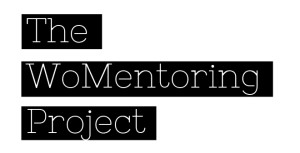
by Lisa Devaney | 15 Apr, 2014 | The WoMentoring Project
For many female writers starting off, affording access to support resources can be a barrier.

The WoMentoring Project debuts today!
Writing retreats are costly, classes are costly and sometimes difficult to manage with work and family life, and it isn’t easy figuring out how to connect with agents, publishers or other writers who could help guide a new writer through the process.
Stepping in to help female writers is The WoMentoring Project. Debuting today, this is an entirely volunteer effort driven by established female writers who want to help others. The group is a collection of writers, editors and literary agents who are pairing up with new UK female writers to serve as mentors, for free. Ignited by a conversation that started on Twitter, the idea got popular response from the female writing community and, quickly, the effort began.
The hope is that through this mentoring effort a new wave of female voices in the UK will emerge with powerful, diverse and stories to share.
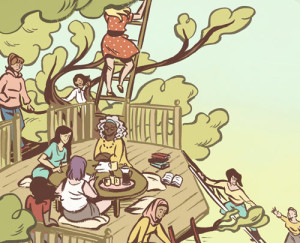
Women mentoring women.
What’s this about?
The mission of The WoMentoring Project is simply to introduce successful literary women to other women writers at the beginning of their careers who would benefit from some insight, knowledge and support.
It will work by having each mentor select their own mentee and it is at their discretion how little or much time they donate. They have no budget, it’s a completely free initiative and every aspect of the project – from the project management to the website design to the PR support – is being volunteered by a collective of female literary professionals. Quite simply this is about exceptional women supporting exceptional women.
Why is this needed?
While discussing the current lack of peer mentoring and the prohibitive expense for many new writers on Twitter – among a community of writers, editors and agents – the question was asked about who would be willing to donate a few hours of their time to another woman just starting out. The response was overwhelming – within two hours they had over sixty volunteer mentors.
For many involved, they received unofficial or official mentoring in starting out their careers, which helped them get ahead. The volunteers want to put their emphasis on ‘paying forward’ 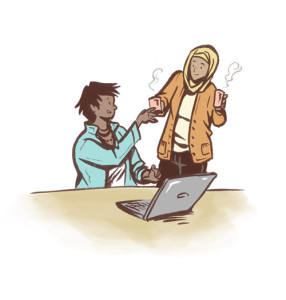 some of the support we’ve been given.
some of the support we’ve been given.
In an industry where male writers are still reviewed and paid more than their female counterparts in the UK, they want to balance the playing field. Likewise, they want to give female voices, that would otherwise find it hard to be heard, a greater opportunity of reaching their true potential.
How to Apply?
In an ideal world The WoMentoring Project would offer a mentor to every writer who needed and wanted one. Of course this isn’t possible, so instead they are trying to ensure the application process is accessible, while also ensuring that the mentors have enough information with which to make their selection.
Applicant mentees will submit a 1000 word writing sample and a 500 word statement about how they would benefit from free mentoring. All applications will be for a specific mentor and mentees can only apply for one mentor at a time. Selections will be at the mentor’s discretion.
Who’s involved?
Kerry Hudson, whose novel, Tony Hogan Gave Me An Ice Cream Float Before He Stole My Ma is leading The WoMentoring Project and has rallied a committed group of women writers, editors and publishers to join the effort, and here’s what some of these volunteers have to say about the project:
The reason I’m doing this is simple: mentoring can mean the difference between getting 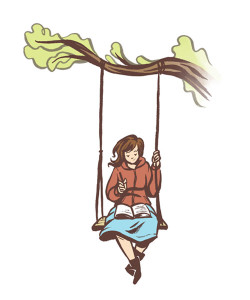 published and getting lost in the crowd. It can help a good writer become a brilliant one. But till now, opportunities for low-income writers to be mentored were few and far between. This initiative redresses the balance; I’m utterly delighted to be part of the project.
published and getting lost in the crowd. It can help a good writer become a brilliant one. But till now, opportunities for low-income writers to be mentored were few and far between. This initiative redresses the balance; I’m utterly delighted to be part of the project.
-Shelley Harris, author of Jubilee
I have only achieved the success I have with the help of others, and now I am keen to pass on that help. I particularly want to reach out to those who don’t have the privileges of wealth, status or existing contacts, but who have so much to gain and to give.
-Marie Phliips, author God’s Behaving Badly
I’m so pleased to be involved in the WoMentoring Project, and I can’t wait to meet my mentee. I know from my own authors how isolating an experience writing can often be, especially when you’re just starting out, and so I really wanted to be involved. I hope that knowing that there is someone on your side in those early days will give writers courage and confidence in their work.
-Alison Hennessy, Senior Editor at Harvill Secker
The WoMentoring project is the kind of opportunity I would have relished when writing my first novel. It’s founded in the spirit of paying it forward, and I’ll take real pride in sharing whatever experience I’ve gained with a mentee. I’ve benefited from the advice and encouragement of some truly inspirational writers, the right voice cheering you on can make all the difference when you’re in your solitary writing bubble. The formality of the mentoring arrangement also gives a sense of responsibility and focus – something that’s invaluable when you’re lost in the sprawl of a work-in-progress – and it’s beneficial to mentors too.
-Amylia Hall, author of The Book of Summers
My career as an editor has been immeasurably enriched by working with inspiring women writers, yet the world of publishing would have been inaccessible to me without the time and support I was given when first starting out. The WoMentoring Project is a wonderful, necessary thing and I’m very proud to be taking part in it.
-Francesca Main, Editorial Director, Picador
I wanted to get involved with this project because I’d like to help authors feel that whoever they are, and wherever they come from, they have a right to be heard.
-Jo Unwin of the Jo Unwin Literary Agency
What are the emerging female writers saying about The WoMentoring Project?
I’m interested in being mentored because although I think you have to make mistakes to learn, having someone who’s been there help you work out the ones with no value can be really useful. Most of all I’d like to have someone to push and challenge me on what makes me and my writing tick.
The idea of women sharing their skills and experience in a dynamic, nurturing way is a really important one given the lower profile given to female writers. Even though the mentoring is one to one a collective voice and resilience is still being built up – I think it’s a great idea that, for writers like me, will help get rid of some of the layers of doubt and creative loneliness that come with being a beginner.
-Clare Archibald
I’m on my third novel; I’ve had good notices from Faber, HoZ etc. but still not quite there. What I need is that final push. I especially need guidance on pacing, keeping the action pulsing along. I feel a mentor could be hugely beneficial in this process.
-Suzy Norman
How can you support The WoMentoring Project?
For it’s debut, the project would love your support on social media, so please tweet about it, share it with your Facebook freinds, post it on G+, LinkedIn, etc.
The hashtag is #WoMentoring and you can find them on Twitter at
@WoMentoringP.
If you are a member of the press and would like an an interview with the founder, please contact:
Lisa Devaney
lisa@haimediagroup.com
***Special thanks to the artist Sally Jane Thompson for creating the illustrations pictured here for The WoMentoring Project.

